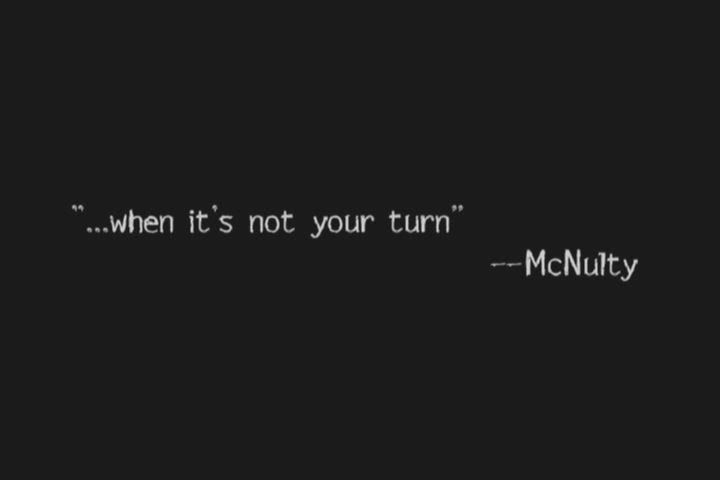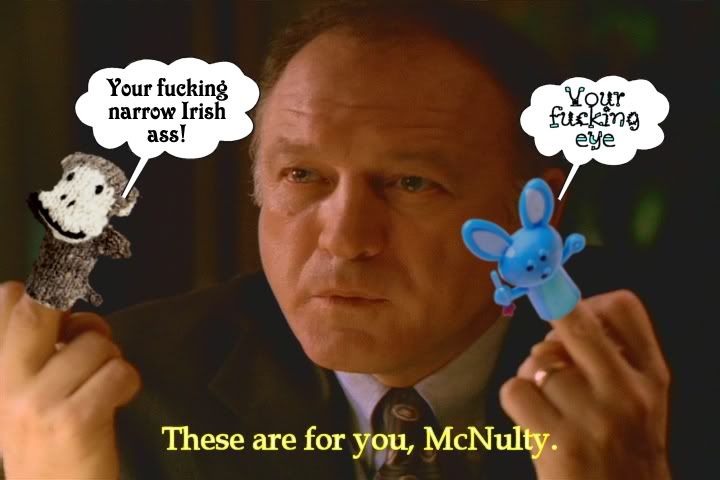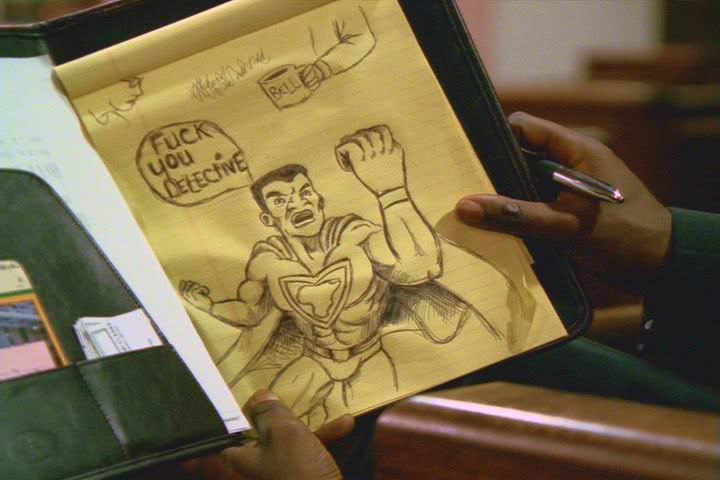Some formatting notes: I'll open each entry with some general notes if I have them before I launch into spoilers that might either be for that specific episode or span the entire series. In other words, readers who have not reached the end are urged to return to these posts only when they have.
"The Target" (1x01)

It doesn't start easy -- that's what I remember when I first started watching, and even though "The Target" is the pilot episode and actually shows the beginning of the Barksdale saga, we might as well have entered into the thickest part of the story. After all, we're thrown into the deep end with the jargon- and slang-filled dialogue and the nitty-gritty of police bureaucracy and drug dealing; what's more, "The Target" sets up the entire aesthetic scope of the series, where even the procedural minutiae become intricate components of the story.
Read more after the jump.

Beginning at the beginning again, I couldn't shake the pervasive sense of Joycean parallax -- I don't simply mean being better able to follow the sometimes byzantine plot, but instead, knowing what happens to certain of the characters (and given the level of Realism on the show, my experience was eerily like knowing the fates of quasi-real people) resonated in very strange ways, and the parallax also allowed me to see symmetries in the story itself that I hadn't noticed the first time. In both cases -- that is, my experience of characters' resonances and narrative symmetries -- were deliberately crafted by the writers (those stone-cold writers' writers), but in some instances, they were inescapably accidents.
The resonances then. You know, seeing McNulty prowling the scene, not yet in full raging drunk mode, oh how low he's going to fall, etc., that's a given. But stranger, more affecting and haunting was seeing Det. Cole and Maj. Foerster, because the actors who played both of them actually died in the middle of the show's run, which were actually incorporated into the show itself, and in seeing Cole and Foerster, all these weird relations in The Wire's blend of fiction and journalism rippled out in a creepy, elusive way.
As for the symmetries. McNulty sparks off the entire move towards the creation of the Major Crimes Unit, but the action that spawned MCU is also the prototype for his inimitable brand of passive-assholery, i.e. positioning himself into a situation (into which, if he's been sober enough, he's put a modicum of thought) that's sufficiently fubared that others around him have to clean up his mess. In this case, he sat in at a court hearing even though the case didn't belong to him, which of course piqued Phelan's interest (Phelan flagged McNulty down, remember), which in turn led to the Judge to come down on the police department, etc. Clearly, Jimmy's "plan" this time wouldn't be the last stunt he'll pull, and eventually, the consequences of another plan, considered in half, bound to piss off a lot of people, would finally exceed his intentions in season 5.
Moving along, I've come to think of Bubbles as late capitalism's answer to Chaplin's Little Tramp. Both persevere in the heart of the oppressive circumstances of their respective times (impersonal urbanity for the Tramp, the war on drugs for Bubbles), without giving up their faith in human decency. Bubbles even has the similarly frumpled, oversized, sagging motley outfit -- and you can think of his hair as a weird approximation of a bowler. I will proffer visual evidence when I come to a serviceable shot of Bubbles.
Meanwhile, in his debut, Rawls kept his most raging, next-level, acid-ringed asshole in his pants -- to our collective loss.
Lastly, I've puzzled for a long time about D'Angelo, how he carries himself in this episode so differently from how he carries himself throughout the rest of the season. My first impression of him was that he was an emotionally volatile and undependable flake; after all, we initially see him on trial after he twitched out and killed a guy -- in front of witnesses, in a Barksdale-controlled building. He's hardly any different than that panicked, homiciding manchild when he's hanging around with the upper echelon of the organization, all overeager and ingratiating overcompensating, trying to act harder and bigger than he is, which is no real wonder considering how physically imposing Stringer, Avon, Wee-Bey, et al are. But once D gets moved to the Pits, his demeanor promptly calms down, which, I thought, was at odds with his initial characterization. He's no doubt smarting from the demotion, but all of a sudden he's cool D, he's sage D dispensing wisdom to Wallace, Bodie, and Poot. Yet the episode's final image of him backing away from the scene of William Gant's murder shows us it's all a front, that while he wants to maintain credibility and face in front of the young hoppers, and while he wants to prove his street-hardened worth to Uncle Avon, we're seeing just how badly the Game is tearing him apart.
(I know, kind of obvious.)

Indie rating: Born Ruffians - "I Need A Life (Four Tet Remix)"
3 comments:
I haven't even taken the plastic off my box yet because I haven't finished grading, but let me tell you how happy I am that you are doing this. I have been watching the auditions for STYCYD Canada on Youtube to keep my spirits up until I finish reading these papers.
Solution: B-pluses all around! Also, don't get your hopes up too much, I've just watched and am scrambling for something to say.
I like what you already said, because I've already watched the whole show and now I also will want to see how my experience is different the second time around.
People already recapped it as it aired.
I recall that first scene with Stringer Bell the courthouse as assuming he was a lawyer: well dressed, watching the trial. He had already perfected the persona of the successful professional and could slip in and out. Later, when McNulty sees the inside of his apartment he asks himself something like "who have I been following all this time?" One of the best moments in the show for me.
Post a Comment